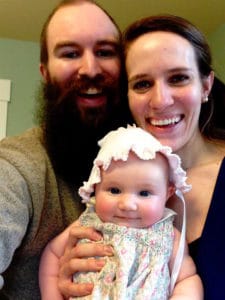

No matter who you are or where you live, it’s easy to come up with reasons not to save. Maybe you live in an expensive city and struggle to pay rent, let alone set something aside. Or perhaps you have pricey hobbies, kids in daycare, or a penchant for dining out.
Maybe your commute is killing your finances – with an hour drive each way to work, you’re stuck paying thousands of dollars in car payments, gas, and upkeep every year.
Whatever your excuse is, almost everyone has one. Of course, some people buck the trend and save more money than most – against all odds.
Meet the Frugalwoods

The bloggers known as Frugalwoods fall squarely into that camp, even though they have every reason to be spendthrifts. Not only does the couple and their baby live in one of the priciest regions of the United States (Cambridge, Massachusetts), but they both had regular 9-5 jobs and faced the same temptations as the rest of us until recently.
Crazy enough, they have also had a $2,741 mortgage to contend with. Yet, they have still managed to save at least 50 percent of their income for years. Better yet, they have invested those savings into low-cost index funds all along – growing their wealth and paving the way towards their early retirement dreams.
Fortunately, all the hard work and sacrifice has paid off. In just a few short weeks, the Frugalwoods are moving to a 66-acre homestead in Vermont. Once they are settled, they’ll continue working remotely as they make the final push towards financial independence. And the property with a $2,741 mortgage? Their old home has now become their first income-producing rental property.
Yes, their intricate plan is now coming together better than anyone could expect. But, how did they do it? To learn more, I sat down with Mrs. Frugalwoods and picked her brain.
Extreme Frugality for the Win

True to their name, the Frugalwoods do everything they can to avoid spending money. And while some might view their lifestyle as “extreme,” the pair has become extremely comfortable with their way of living, so much so that they expound the virtues of extreme frugality almost every day on their blog, Frugalwoods.
But the couple doesn’t really feel like they are going without, she says. Instead of sacrificing everything, they have focused most of their efforts on cutting out “extras” that don’t add value to their lives.
“When we really began examining our budget, it turns out that the vast majority of expenditures were for wants, not needs,” she said. “Our philosophy is to try anything for a one month time frame. If by the end of the month we’re happy with our savings, then we continue on.”
But, what does that mean? So far, that has meant giving up things like dining out, new clothes, and household help. Oh, and Mr. Frugalwoods has been a bike commuter for years – as in, he doesn’t drive a gas-guzzling car to work. The Frugalwoods barely hit the mall and avoid sales in favor of just not buying anything.
Another way the Frugalwoods save money: they in-source almost everything imaginable. Where most people hire someone to clean their house or change their oil, the Frugalwoods take care of it themselves. Heck, they even cut each other’s hair to save on the bi-weekly expense.
And instead of buying stuff, they find it. The Frugalwoods have been known to dig through the trash to find snazzy pieces of furniture, clothes, and perfectly functional household goods.
“We consider our lifestyle to be “frugally luxurious” in that we spend on the things that matter to us most and save everywhere else,” she says.
How the Frugalwoods Save for Early Retirement
With a simple lifestyle and a longing for more free time, the Frugalwoods set their sights on early retirement long ago. Still in their early 30’s, the pair is already on the path towards financial independence – or maybe there already depending on how you crunch the numbers.
Saving for early retirement was the next common step move for them, she says, simply because they want more time to learn, try, do, and explore. While they enjoyed their regular 9-5 jobs in the public sector, they felt suffocated by all the time they had to spend at work.
“It seemed a shame to build a life that required us to put so much time into a single venture, rather than spread our efforts out over the myriad things we want to accomplish,” she says.
If you’re looking for dynamic investing advice though, look elsewhere. The Frugalwoods’ investing style is admittedly snooze-worthy. Instead of trying to time the markets or pull off any fancy financial moves, the couple invests in index funds regularly – never selling when the market is high or low.
In addition to maxing out their work-sponsored retirement plans when they had them, they also invest in a taxable brokerage account with Fidelity – again, with a similar low-key strategy. (If you’re uncomfortable doing this yourself, you can always use a robo advisor service to help you manage your portfolio balancing and asset allocation.) Plus, they have other income streams to count on in early retirement and semi-retirement.
And despite their young age, the Frugalwoods never worry they’ll run out of money. Why? Because they have money coming in all over the place!

“We’ve addressed our financial needs from many different angles and so aren’t reliant on a single income source,” notes Mrs. Frugalwoods. “We have a rental property, the ability to both work remotely while living on our Vermont homestead, substantial investments, and the possibility of one day generating revenue from our land.”
Mrs. Frugalwoods now works as a freelancer – a job she can perform easily at home with her new baby in tow, thus avoiding the high costs of daycare. In the meantime, Mr. Frugalwoods plans to work remotely from their new-to-them Vermont estate for the time being. The longer they can both earn an income, the easier early retirement will become when – and if – they walk away from their work altogether.
How to Retire Early (the Frugalwoods Way)
Whether it’s simply spending too much, not saving or earning enough, valuing short-term pleasures over long-term goals, or giving up before we really try, there are myriad reasons why most of us never get ahead.
Still, nearly anyone could adopt their family’s take on extreme frugality, notes Mrs. Frugalwoods. All it takes is a dose of pure and unadulterated honesty with yourself. You have to ask yourself what you really value, then build your lifestyle around it. Everything that doesn’t matter, she says, should be cut without a second thought.
While there is more than one way to get ahead, Mrs. Frugalwoods suggests the following steps to get started.
- “Closely track your spending,” she says. Get out your bank statements to see where your money went last month, the track all of your daily expenses in real-time from now on. Taking stock of where you spend your money is the best way to rein it in. Sometimes knowing you’re about to spend money – and having to write it down – is enough to talk you out of a purchase altogether.
- Make substantial changes to your spending now rather than waiting for some future date,” notes Mrs. Frugalwoods. In other words, don’t wait for permission to get started. There will never be a “perfect time,” so you might as well start today.
- “Build goals about what retirement would look like beyond not working,” she says. According to Mrs. Frugalwoods, it helps to have something to “retire to,” instead of trying to retire away from something. As you work your way towards early retirement, having something to be excited about will help you stay motivated.
- Diversify your assets, investments, and revenue streams. No one should forge a path towards early retirement with one income stream alone. To put yourself in the best position possible, you need money coming in from as many angles as possible.
Final Thoughts
Whether you want to retire early or not, moving towards a more frugal lifestyle is a smart move. “Spending less money means you save more money, but it also means you need less money,” she says. “It’s essentially the fast track to financial independence.”
If you want to give extreme frugality a try, check out the Frugalwood’s Uber Frugal Month Challenge.
Chances are, you’ll find out that many of your “needs” are actually “wants.” And, if you could save that money instead? You could be on the path towards financial independence much faster than you think!
What is your take on extreme frugality? Would you ever cut your own hair to save money?























